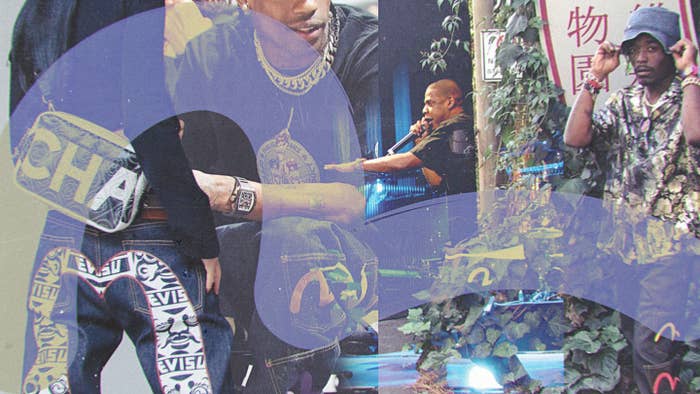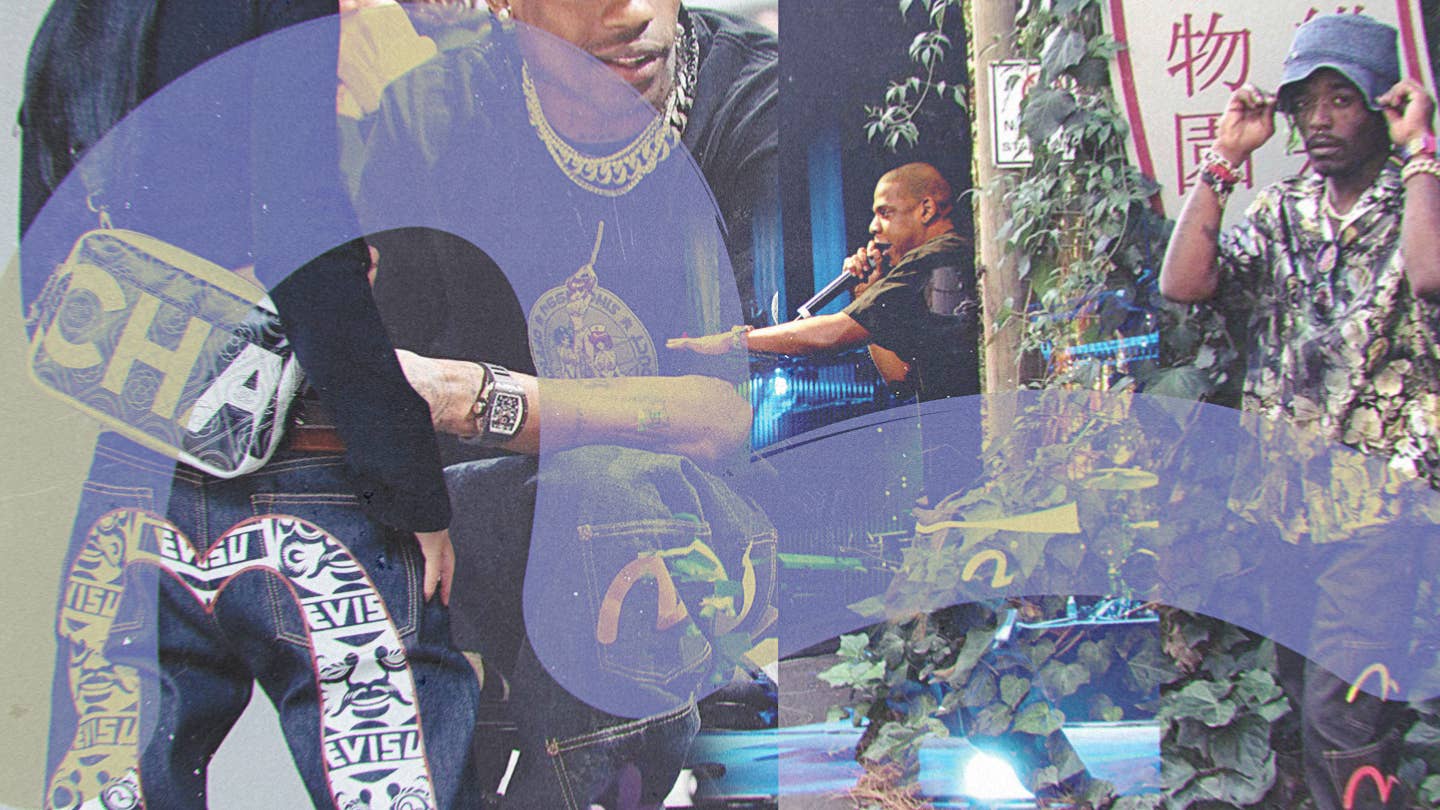
There may be a Travis Scott x Evisu collaboration on the way. Evisu hasn’t confirmed, but they did post an image of Scott wearing an ivory denim set with Evisu’s seagull logos and Cactus Jack motifs to its Instagram page.
Artists have always looked to Evisu for its premium, Japanese denim—Jay-Z and Lil Wayne were big fans in the early Aughts. But Evisu started to trend again once entertainers like Scott and Lil Uzi Vert started wearing the denim. Ahead of the Cactus Jack x Evisu collab, we thought we’d chart how the brand started, how it evolved, and why it’s become so popular with celebrities.
American denim became a hit in Japan in the 1950s. However, Levi's and Wranglers didn't fit Japanese men, therfore tailors would cut and remake the jeans for a smaller frame. Despite its widespread success in the ‘70s, the quality of American denim decreased as demand increased. Several Japanese designers grew tired of the low-grade materials and sought to revive denim the Japanese way: hand-dyed processes, vintage machines, and a labor-intensive weaving method that’s centuries old. Brands like Studio D'Artisan, Denime, Full Count, and Warehouse began to surface in the early ‘80s and ‘90s and became well-known for their quality and special details. But it wasn't until Hidehiko Yamane entered the scene in the early '90s, that the rest of the world latched onto Japanese denim. He did that with his line Evisu.
Before establishing his label, Yamane spent some time researching vintage denim and went on a quest to create the perfect pair of raw, durable jeans. Along with his co-worker Mikiharu Tsujita, who later launched his own denim brand Full Count, Yamane quit his day job as a tailor and started Evisu in 1991. A nod to the Japanese god of prosperity "Ebisu," who is seen holding a fishing rod, Yamane carefully chose this name in appreciation of his two favorite things: fishing and money. In the beginning, Evisu was only producing 14 pairs of jeans a day out of his Osaka workshop. The weaving looms he used to make them hadn't been operated for over 40 years at the time, but those machines played a significant role in creating the "vintage" style denim he wanted. Each pair of Evisu jeans went through a time-consuming process: The vintage loop machines would feed a rope of cotton yarn through tubs of rich indigo dye, back out, and up to the factory's roof where the color would oxidize. This process was repeated as much as 30 times, which made production slow and the jeans expensive. When Evisu first launched, Yamane would take a hand brush with white paint, and arcuate the 'm's on the back pockets—they are meant to resemble seagulls, a nod to the founder's obsession with fishing. In W. David Marx's book Ametora, Yamane said, "The paint was a half-joke. I never thought anyone would buy them." Those seagulls eventually became Evisu's trademark and a catalyst for what's to come.
Seven years after he launched his first store in Osaka, Yamane introduced a ladies line called Evisu Donna. Shortly after, in the early 2000s, Yamane had aspirations to take things up a notch, so he tapped Peter Caplowe, a Hong Kong-based entrepreneur. Caplowe, who later launched a fashion trade show in Asia called The Hub, helped distribute Yamane's unique, gaudy jeans to the cool kids in London and New York. This was the beginning of Evisu’s mainstream success—a first for a Japanese denim brand. Yamane's influence continued to expand, spilling into the world of streetwear and garnering co-signs from prominent rappers like Jay-Z and Lil Wayne. The brand was name-dropped in a couple of fan-favorite tracks, like "Show You How," by Jay Z (“These ain't Diesel, these Evisu”), "ASAP" by T.I. ("Seen on the scene white tees and Evisu"), and "Lock and Load" by Lil Wayne ("Back pocket jeans fallin, cover my Evisu sign").
Evisu was now a part of a new era in hip-hop fashion, when sweatbands, tall white tees, and throwback jerseys reigned supreme. To have your brand mentioned in a hip-hop song was a pretty big deal, and for Evisu, it helped establish them as the denim brand to have. It was premium, authentic, and made from scratch—something other high-end denim brands like Tommy Hilfiger and Calvin Klein weren't really doing.
Evisu's first brand partnership was in 2002 with Puma. Both brands came together in celebration of the World Cup to collaborate under the Evisu Shoes Collection, which had 100 designs per season. However, according to the website's timeline, that is the only collaboration under Yamane during his stint as head creative director. Later in the mid-2000s, some sources alleged that Yamane, along with another firm, was accused of tax evasion. This also happened around a time when brands began to make cheap Evisu knock-offs.
A South Korean brand named Wolbi sold a large amount of counterfeit Evisu denim, generating over $450 million per year. The fake jeans were made so well that many South Koreans believed the replicas were real. Evisu filed a lawsuit against Walbi but ended up losing. Needless to say, this was only a small dent in Evisu's resume. Ultimately, this all led to the brand finding new management. Scott Morrison, the founder of Earnest Sewn, took over in 2010 with hopes of continuing the legacy it built and breaking Evisu into smaller sub-brands. Unfortunately, his stint with the brand only lasted about a year.
Ten years ago, the company was $50 million in debt, but when investors were on the brink of completely giving up, David Pun, an executive director of a private equity firm, stepped in. "I flew to New York and convinced the founder of the fund that there were all these opportunities and that the turnaround strategy was sound," Pun toldCEO Magazine. "Even having said that, they'd already made up their mind. In hindsight, I don't know why I came up with the idea, but I just thought, 'Why don't I raise some capital and buy it?' Because at the time, there was a huge opportunity, especially in Asia." Pun took a chance on Evisu, purchased it, and restructured it from top to bottom—from design and marketing to negotiating with shareholders.
In a matter of years, Evisu did a complete 180; yearly expenses went from $12 million to $4 million, its presence in Asia regained momentum, and the brand's offerings diversified to outerwear, sweatshirts, and kidswear. Pun wanted to keep that legacy alive through the younger generation, and he's doing just that. In 2016, they collaborated with best-selling condom brand Durex to create a denim condom pouch—a bold marketing move that caught a lot of attention. Evisu also partnered up with European streetwear brand Palace Skateboards in 2020 to release a collection that ended up selling out in minutes.
Current rap favorites like Lil Uzi Vert have been spotted wearing a pair of the seagull-branded jeans, and recently, Evisu confirmed an upcoming Travis Scott collaboration via Instagram. The Houston rapper is a longtime fan of the brand, rocking a pair to NBA games and, most recently, teased the collab at Khloe Kardashian's birthday party.
Currently, Evisu stores are mainly in Asia since Pun made the decision to exit the U.S. and European markets while restructuring. The premium denim brand still remains four to five times more expensive than what the average consumer is willing to pay, and what also makes things tricky is that the international site does not sell 100 percent Japanese raw denim unless you spend over $600+ for a pair.
According to YouTuber KeezyTV, ordering from the Japanese website or shopping in their stores in Japan is probably the only way to get a premium, top quality pair of Evisu jeans; the downside is that they only ship within Japan or you'd have to fly there to purchase. The majority of the products on their international online store are made in China. Although they are quality goods, a percentage of the quality is compromised. Regardless, it's been a remarkable turnaround for Evisu, and hopefully, with Pun's leadership, things will continue to improve.

